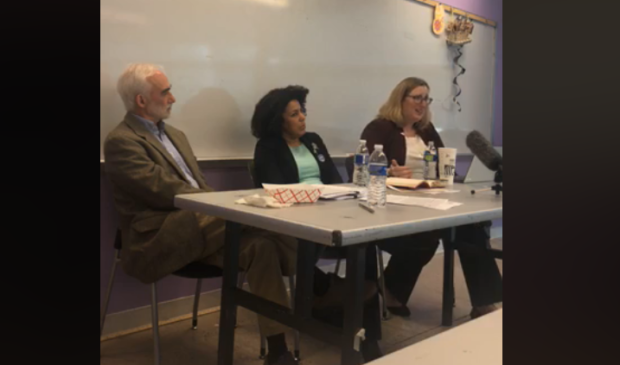About the Author
Chad Swiatecki is a 20-year journalist who relocated to Austin from his home state of Michigan in 2008. He most enjoys covering the intersection of arts, business and local/state politics. He has written for Rolling Stone, Spin, New York Daily News, Texas Monthly, Austin American-Statesman and many other regional and national outlets.
Newsletter Signup
The Austin Monitor thanks its sponsors. Become one.
Most Popular Stories
- Firefighters to seek firing of Chief Baker
- Office slowdown sparks new downtown housing ambitions
- Downtown Historic Resource Survey eyes seven new districts eligible for designation
- With cap of $687M, bond task force to weigh $4.4B in city needs
- Elon Musk narrowly wins fight against neighbors over Austin-area home
-
Discover News By District
Popular Whispers
Sorry. No data so far.

Panelists examine impact of taxes, paid leave and school funding for Latinos
Monday, December 16, 2019 by Chad Swiatecki
The importance of federal tax policies, family paid leave programs and the effects of the state’s school financing structure on affordability in Austin were among the issues discussed Thursday by a panel of state and federal policy analysts, with the goal off addressing matters important to Latinos.
The panel, which was organized by the advocacy group UnidosUS Action Fund and held at the Emma S. Barrientos Mexican American Cultural Center, looked at the evolving federal tax breaks that could lift many Latinos and other populations out of poverty, as well as possible state tax policy that could address affordability issues for homeowners and renters in Austin.
Among the speakers was Mayor Pro Tem Delia Garza, who opened her presentation by discussing the city’s change to a district system for electing City Council members. She said Austin’s 40 percent Latino population is stressed even more by the rising cost of housing, with estimates of more than 100 people moving to the city each day. She said Council’s vote on Wednesday to approve the first reading of a new Land Development Code is a positive step that can lead to more housing supply and reduce gentrification pressures on longtime residents.
“The biggest issues in Austin are affordability issues, and that is not an Austin problem, it is a countrywide problem,” said Garza, who will not run for reelection so she can pursue the position of Travis County attorney. “We don’t have the housing stock because our housing stock hasn’t kept up. A (not-in-my-backyard) culture has hurt our housing supply and we see why it is hard to make those big changes.”
Jennifer Brown, associate director of economic policy for UnidosUS, told the audience that possible expansions of the federal Earned Income Tax Credit and the Child Tax Credit that are currently under discussion could lift millions of Texas families out of poverty. Another bill that would greatly expand family paid leave rules nationwide is seen as a major issue for Latinos.
Brown said instead of those bills moving forward at the federal level – with neither of Texas’ U.S. senators signed on in support – more attention is being paid to a bill that would provide tax breaks for the purchase of race cars and racehorses.
“This, over alleviating and lifting up people out of poverty, especially children,” she said. “This is asinine in my opinion and I find this to be ridiculous and comical, along with a lot of my colleagues in Washington who feel the same way. I don’t understand how you can go to bed at night feeling this way.”
On the issue of property taxes and the view that the state’s recapture system for distributing property tax revenues hurts Austin homeowners, financial analyst Richard Levine of the Center for Public Policy Priorities said Austin’s disproportionate payments into recapture come from properties in Dallas, Houston and other wealthy areas being undervalued in their appraisals for years.
Changing that dynamic won’t create much property tax relief for Austin homeowners, though he said some possible realignment of homestead exemptions that would eliminate large reductions for valuable homes would raise total revenue and gradually flatten out disparities in recapture payments statewide.
“In Austin (recapture) has been demonized and characterized as a drain on resources, but that’s because people aren’t thinking about community in a broad enough sense,” he said. “You should think about school finance as a state system where you put in resources from across the state in property taxes and then you distribute it back. If you think about it that way, Austin has more money per student, even for those with extra needs, than most other school districts in the state.”
Local activist Vanessa Fuentes, who is considering running for Garza’s District 2 Council seat, said the discussion highlighted the variety of ways quality of life for local Latino populations can be improved.
“Things like paid family sick leave are so important to families, especially knowing that women of color oftentimes are the primary breadwinners in the family and they have to make some tough decisions,” she said.
“I was glad to see Austin passed a paid sick leave policy even though that’s still being figured out. It’s important to see what options are out there and what things are happening at the state and federal level and I would like to see our state do more, which is why the 2020 election is so important to elect progressive leaders.”
Video still courtesy of UnidosUS Action Fund.
The Austin Monitor’s work is made possible by donations from the community. Though our reporting covers donors from time to time, we are careful to keep business and editorial efforts separate while maintaining transparency. A complete list of donors is available here, and our code of ethics is explained here.
You're a community leader
And we’re honored you look to us for serious, in-depth news. You know a strong community needs local and dedicated watchdog reporting. We’re here for you and that won’t change. Now will you take the powerful next step and support our nonprofit news organization?


